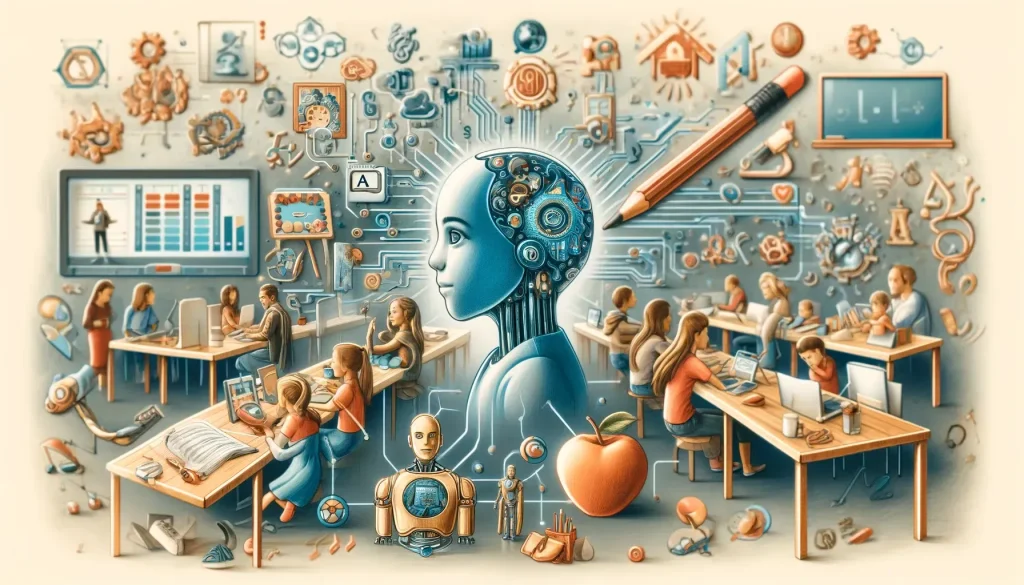AI in Education is revolutionizing how students learn and interact with knowledge. A pioneering private school in Texas, Alpha School, exemplifies this shift by integrating artificial intelligence education into their curriculum, allowing students to learn at an accelerated pace. Co-founder Mackenzie Price and student Elle Kristine highlighted the AI classroom integration benefits during a recent appearance on ‘Fox & Friends’, showcasing how this innovative approach leads to top national academic performance. With students spending only two hours per day in guided sessions with AI tutors, they are placing in the top 1 to 2% of their peers nationwide. This educational technology trend signals a future where AI tutoring benefits not just individual learning, but overall educational outcomes as well.
The incorporation of advanced technology in learning environments is transforming education as we know it. This movement, marked by intelligent systems and digital interfaces, is enhancing how knowledge is dispersed and consumed. In establishments like Alpha School in Texas, the application of artificial intelligence is not just a trend but a strategic framework for facilitating accelerated learning. Students benefit from personalized tutoring through AI platforms, allowing for tailored educational experiences that cater to individual needs. The rise of such methods speaks to a broader narrative where educational technology is reshaping classrooms, fostering deeper engagement, and realizing the full potential of diverse learning styles.
The Role of AI in Revolutionizing Education
Artificial intelligence has the potential to revolutionize the educational landscape, especially in private schools like Alpha School in Texas. By integrating AI into the curriculum, students are reported to learn significantly faster, showcasing the efficiency of modern educational technology. The Alpha School initiative focuses on personalized learning experiences, leveraging AI-powered tools that adapt to the individual needs of each student. Such dynamic integration allows educators to track progress in real-time, ensuring that students receive immediate assistance where needed.
The model employed at Alpha School, where students spend only two hours a day receiving tailored instruction from an AI tutor, highlights the effectiveness of this approach. This novel system not only enhances learning outcomes but also caters specifically to the diverse learning paces of students. As a result, students are achieving remarkable academic success, ranking in the top 1 to 2% nationally. This pushes the boundaries of traditional education methods and sets a precedent for other schools to follow, signaling a shift toward an AI-centric classroom.
AI Classroom Integration: A New Frontier for Learning
Integrating artificial intelligence into the classroom is ushering in a new frontier for learning, with Texas schools leading the charge. The Alpha School experience exemplifies how a structured AI-supported environment can foster an innovative learning atmosphere. As this trend grows, educators are embracing AI technologies that personalize student learning, thus optimizing their educational journeys. AI tools can analyze data more efficiently, tailoring lessons to meet individual needs while also reducing teacher workloads, allowing them to focus on more interactive teaching methods.
Moreover, the integration of AI in education is not just about enhancing student performance; it also prepares them for future job markets that increasingly demand technological proficiency. By familiarizing students with AI systems, schools like Alpha are equipping them with essential skills and knowledge that extend beyond academia. This strategic approach aligns with current educational technology trends, positioning students at the forefront of the digital evolution, ready to tackle challenges in an AI-driven world.
AI Tutoring Benefits: Enhancing Student Performance
AI tutoring presents significant benefits that directly enhance student performance, as evidenced by the Alpha School case. With students being guided by AI tutors, they experience a more customized learning journey that promotes greater engagement and understanding. The AI tutors can provide instant feedback, enabling students to revise and improve their responses independently. This results not only in faster learning but also in the acquisition of critical thinking skills that are essential for academic success.
Additionally, AI tutors are available around the clock, allowing students to study and seek help on their own schedule. This flexibility can alleviate the pressure of adhering to rigid classroom schedules and encourages students to take control of their educational journeys. Such a system also fosters self-directed learning, an invaluable asset in today’s information-centric world, where cultivating curiosity and resilience is crucial for long-term success.
Texas School AI Initiatives: Leading the Charge
Texas schools are increasingly adopting innovative AI initiatives, with Alpha School serving as a trailblazer in this movement. By implementing AI-driven technologies within their educational frameworks, these schools aim to enhance student engagement and learning outcomes. The state’s commitment to educational technology trends illustrates a forward-thinking approach, ensuring that students not only keep pace with their peers nationally but also excel beyond traditional metrics.
These initiatives reflect a national trend towards integrating sophisticated technologies into the education sector. Schools that embrace AI solutions can offer a curriculum that adapts to a rapidly changing workforce landscape. As Texas continues to place importance on these advancements, the implications for educational policy and practice are profound, as other regions may look to replicate this model of success.
Educational Technology Trends: The Future of Learning
The rise of artificial intelligence in the education sector is part of broader educational technology trends shaping the future of learning. Schools like Alpha School are harnessing AI not just to facilitate better learning outcomes but also to foster a culture of innovation and continuous improvement. These trends point to a growing reliance on technology to enhance traditional classroom settings, ultimately making learning more accessible and effective for all students.
Additionally, technology trends such as interactive learning environments and the use of analytics for tracking student progress are becoming standard practice. As these trends evolve, educators must adapt their teaching methods to incorporate these tools effectively. Embracing educational technology trends signals a shift towards more adaptable and student-centered approaches, which could redefine educational practices globally.
Anticipating AI Trends in Education
As the educational landscape evolves, it becomes crucial to anticipate future AI trends that will continue to shape how students learn. The current integration of AI in Texas schools, particularly Alpha School, exemplifies the potential impact of these advancements on students’ educational experiences. With AI facilitating personalized learning and improving subject mastery, the trajectories of educational practices are set to change dramatically, paving the way for more innovative approaches to teaching.
A key trend to watch is the increased use of AI for adaptive learning solutions that continue to evolve alongside the students’ progress. These systems are designed to adjust learning content and strategies dynamically, ensuring that no student is left behind. This anticipatory model positions AI as an essential partner in education, mirroring the future job landscape where adaptability and continuous learning are paramount.
The Ethics of AI in Education: Navigating Challenges
While integrating artificial intelligence in education brings many benefits, it also raises ethical concerns that educators and policymakers must address. The rapid adoption of AI technologies in schools like Alpha School requires careful consideration of issues such as data privacy, equity of access, and the potential for algorithmic bias. Ensuring a responsible and equitable implementation of AI is crucial for maintaining trust and effectiveness within the education system.
Furthermore, as schools continue to explore new technologies, they must develop frameworks to guide ethical AI use. This includes establishing clear guidelines for data protection and encouraging transparency in AI decision-making processes. As the educational landscape undergoes transformation through AI, cultivating an ethical approach will ensure that these tools enhance rather than hinder educational outcomes.
Preparing Students for an AI-Driven Future
As AI technology continues to permeate our daily lives, preparing students for an AI-driven future is more critical than ever. Educational institutions, especially those embracing AI tools like Alpha School in Texas, play a vital role in equipping students with the necessary skills to thrive in an increasingly automated world. These skills include not only technical literacy but also critical thinking, creativity, and adaptability—qualities that will be essential in future careers.
To achieve this goal, schools need to integrate AI into their curricula thoughtfully, fostering a learning environment that encourages innovation and exploration. By facilitating hands-on experience with AI technologies, students can develop a deeper understanding of their capabilities and limitations. This proactive approach ensures that future generations are not just consumers of technology but also active participants in shaping its evolution.
The Global Perspective on AI in Education
The embrace of artificial intelligence in education is not limited to the U.S. alone. Globally, many countries are exploring AI-driven educational technologies that promote effective learning outcomes similar to those seen at Texas’s Alpha School. This trend reflects a shared understanding of the importance of integrating advanced technologies in preparing students for a competitive global workforce.
By examining successful AI implementations worldwide, educators can glean insights into best practices and challenges faced in various educational contexts. This international exchange of knowledge can foster collaboration and innovation, pushing the boundaries of what AI can achieve in the classroom. Ultimately, a global perspective on AI in education encourages continuous improvement and adaptation to meet the diverse needs of students across different backgrounds.
Frequently Asked Questions
What are the benefits of AI tutoring in education?
AI tutoring benefits include personalized learning experiences, increased student engagement, and improved understanding of complex subjects. By adapting to each learner’s pace and style, AI can help bridge knowledge gaps and enhance academic performance, as evidenced by Alpha School’s remarkable results.
How is artificial intelligence being integrated into classrooms?
AI classroom integration involves using technologies like AI tutoring systems, learning analytics, and adaptive learning platforms that tailor educational content to individual needs. Schools like Alpha School in Texas exemplify this integration, allowing students to thrive with reduced classroom time.
What educational technology trends are emerging with AI in education?
Current educational technology trends include the rise of AI-enabled tutoring systems, automated grading, and personalized learning plans. Schools like Alpha School are pioneering these trends, demonstrating how AI can significantly enhance learning outcomes.
How is Alpha School in Texas utilizing AI in education?
Alpha School in Texas is utilizing AI by using intelligent tutoring systems to facilitate a personalized learning environment. Students learn for just two hours a day under AI guidance, achieving exceptional academic performance and ranking in the top percentiles nationally.
What is the impact of AI on student performance in education?
The impact of AI on student performance is significant, as demonstrated by schools like Alpha School. With AI-supported instruction, students can learn more efficiently, resulting in higher academic achievement and mastery of subjects, often performing in the top 1-2% nationally.
| Key Point | Details |
|---|---|
| Integration of AI in Curriculum | A Texas school is incorporating AI into its teaching methods, reporting improvements in student learning speed. |
| Impressive Academic Performance | Students at Alpha School study for only two hours a day with AI guidance but rank in the top 1-2% of national test scores. |
| Presence on Media | Mackenzie Price and Elle Kristine discussed AI in education on the ‘Fox & Friends’ program. |
| Global Implications of AI | AI technology is also being applied by companies like Google for scam detection and by Duolingo to offer new courses. |
| Growing Concerns | Tech leaders are expressing concerns about AI’s misuse, with upcoming testimonies from CEOs planned. |
| Innovations in Robotics | XPENG’s humanoid robot, Iron, is a testament to the advancements in AI and robotics. |
Summary
AI in Education is transforming the way students learn, exemplified by Alpha School in Texas, where AI integration enhances educational outcomes. With students studying just two hours a day and achieving top national scores, this approach illustrates the significant potential of artificial intelligence in the classroom. As educational institutions explore innovative technologies, the future of learning looks promising, though it also raises important discussions about ethical concerns and practical applications in everyday learning.

